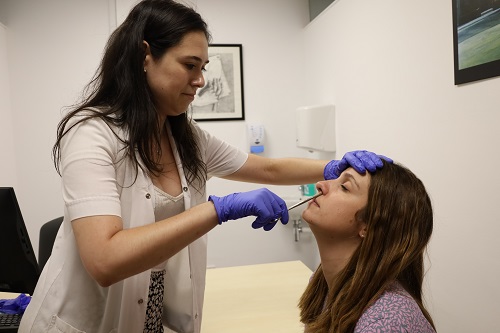
August 10, 2023 - Press notes
A team from the Hospital del Mar Research Institute has, for the first time, detected fetal DNA in the olfactory neuroepithelium of women who have given birth to a boy. A new study will now be launched, which will also analyze female fetal DNA.
The team of researchers has been able to confirm that women with depression had much lower levels of cells from newborns than those who were not suffering from this disorder.
This discovery paves the way to studying the DNA exchange between the mother and the fetus during pregnancy as a factor that protects women against depression, as well as its relationship with other psychiatric disorders.
Having cells from a child can protect women against depression, thanks to the exchange of DNA between the mother and the fetus, according to a study published in the journal Molecular and Cellular Biochemistry. The work, carried out by researchers from the Hospital del Mar Research Institute, the Hospital del Mar, the CIBER on Mental Health (CIBERSAM), and the CIBER on the Pathophysiology of Obesity and Nutrition (CIBEROBN), has shown that women who have less fetal DNA in their olfactory neuroepithelium are more depressed. This is the first time that the presence of fetal cells has been confirmed in this area, which is closely related to the brain and considered to effectively reflect what is happening within that organ.

During pregnancy and childbirth, there is an exchange of DNA between the fetus and the mother; both receive cells that then stay in their bodies. This is what is called maternal-fetal microchimerism. The functions of fetal microchimerism are diverse, such as preventing the fetus from being rejected, strengthening bonds between the mother and child, and ensuring that the fetus receives the nutrients and other elements it needs to grow. There is evidence of the presence of fetal cells in a number of the mother's organs, but now, for the first time, they have been located in a sensitive area that is representative of the brain, the olfactory neuroepithelium, located at the top of the nasal cavity. "It has been shown that the olfactory neuroepithelium contains different types of cells, including neurons. This model is therefore considered interesting for studies of depression and other neuropsychiatric disorders, as it may better reflect what happens in the central nervous system than peripheral models, such as those based on blood cells", says Dr. Pilar Álvarez, a researcher in the Mental Health Research Group at the Hospital del Mar Research Institute and CIBERSAM and adjunct physician in the Psychiatry Service at Hospital del Mar.
The study, now published, only analyzed women pregnant with boys, as it is easier to distinguish the son's cells from the mother's due to the genetic differences between them. The work will now continue with an expanded sample, including women with postpartum depression, in a project funded by the Carlos III Health Institute.
"Women who become pregnant exchange genetic material with their child, which can persist in their body for many years. This DNA exchange has been shown to be a factor that both favors and protects against various diseases. Now, for the first time, we have studied this in relation to depression in a model that is considered similar to the brain. The data obtained suggest that high fetal microchimerism in women who have had a child could be a protective factor in terms of depression", says Dr. Patricia Robledo, principal investigator in the Behavioral Pharmacology and Neurochemistry Research Group at the Hospital del Mar Research Institute.
The work compared the levels of cells from the child in seven women who had male children. Of these, four had a depressive disorder and three did not. Those affected by depression either had much lower levels or no cells at all from their children in their olfactory epithelium. The postdoctoral researcher in the Mental Health Research Group and a CIBERSAM researcher, Alba Toll, concludes that the study data "shows that the olfactory neuroepithelium can be a good model for studying the central nervous system and suggests that fetal microchimerism provides a potential protective factor against depression."
Dr. Beatriz Bellosillo, head of the Molecular Biology Laboratory in the Pathological Anatomy Service and a researcher at the Hospital del Mar Research Institute, points out that the work was possible "thanks to our previous experience in identifying fetal cells in other organs". Now, "the challenge is to identify both male and female fetal DNA cells in the samples that will form part of the new studies."
Although this discovery cannot yet be applied in clinical practice, Dr. Víctor Pérez, head of the Psychiatry Service at Hospital del Mar, and a researcher at the Hospital del Mar Research Institute and CIBERSAM, highlights its importance, as "if confirmed, it could provide us with a good biomarker of a protective factor against depressive disorder in patients, considering that there is no single factor that influences this pathology.” Depression affects more than 5% of the population in Spain, and it is twice as frequent in women as in men, with peaks after childbirth.
Álvarez, P., Bellosillo, B., Colom, F. et al. Y-chromosome in the olfactory neuroepithelium as a potential biomarker of depression in women with male offspring: an exploratory study. Mol Cell Biochem (2023). https://doi.org/10.1007/s11010-023-04807-y


 This site complies with the HONcode standard for trustworthy health information:
This site complies with the HONcode standard for trustworthy health information: Parc Salut Mar
Passeig Marítim 25-29 Barcelona 08003
See location on Google maps
Phone: 93 248 30 00 · Fax: 93 248 32 54
Information request
© 2006 - 2024 Parc de Salut Mar · Legal notice and Privacy Police | Cookie Policy | Accessibility